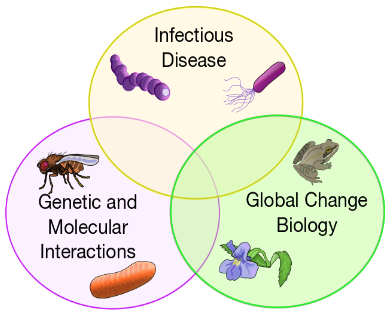Research in Biological Sciences
The Biological Sciences Department consists of over 30 research faculty, postdoctoral associates, and over 60 graduate students carrying out research in Biochemistry, Cell Biology, Molecular Biology, Ecology, Evolution, and Behavior.
Research in our Department is integrative and organized among three broad research themes, with many research labs spanning more than one theme. Our Department has access to facilities that support a wide variety of research, and we are affiliated with several Research Centers and Institutes.

Infectious Disease
Microorganisms are essential for the balance and equilibrium of the environment and in human health. Our researchers study microbial biofilms, cell-to-cell communication, resistance and tolerance to antimicrobials, biofilm dispersion, regulation of biofilm development, host-microbe interactions, bacterial virulence, and microbial imbalance. We work with several in vitro and in vivo models, including continuous, batch and semi-batch biofilm reactor systems, tissue culture, plants, and several animal models. Understanding the microbial behavior and interactions with the host is essential for preventing, controlling, managing and eradicating infectious diseases leading to a healthier environment and population.
Genetic & Molecular Interactions
Complex traits result from genetic variation in multiple genes as well as how these genes interact with each other and environmental factors. Our researchers discover how genetic interactions influence molecular biochemical pathways, organismal physiology and behavior, and evolution and coevolution. Both model and non-model organisms aid our studies of complex trait biology at genetic, genomic, and population levels. Our research will allow us to better understand disease risk and progression, and to predict how well individuals and populations will respond to environmental changes.
Global Change Biology
Humans are having profound effects on the living world. Our researchers study how global change, such as climate change, invasive species, pollution, and land use change impact organisms' behavior and phenotypes, evolution, species interactions and communities, and ecosystem processes and function. We work in aquatic and terrestrial ecosystems, and on various organisms from microbes to vertebrates. Understanding how global change is reshaping biodiversity and ecosystem function is imperative to solve problems at the interface of biology and society and to building a more sustainable future.
Affiliates of the Department of Biological Sciences
-
Institute of Biomedical Technology (IBT)
For more information please visit the Division of Research.